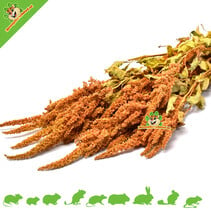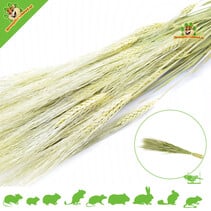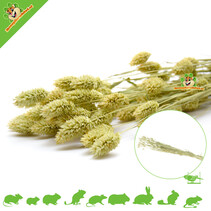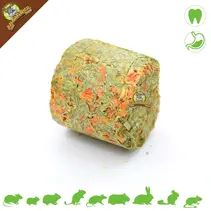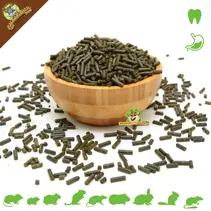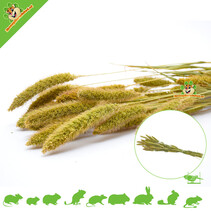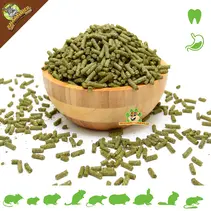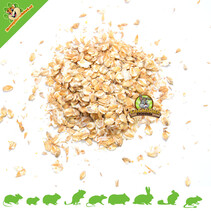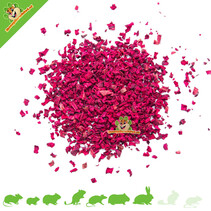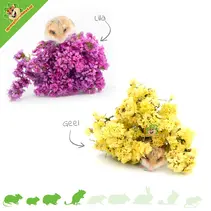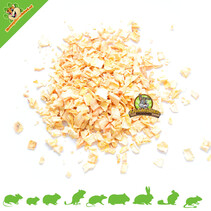Knaagdier Kruidenier
- Voor 17 uur besteld, dezelfde dag verzonden!
- Specialist sinds 2011
- Delivery from our own stock
- Voor 17 uur besteld, dezelfde dag verzonden!
- Specialist sinds 2011
- Delivery from our own stock
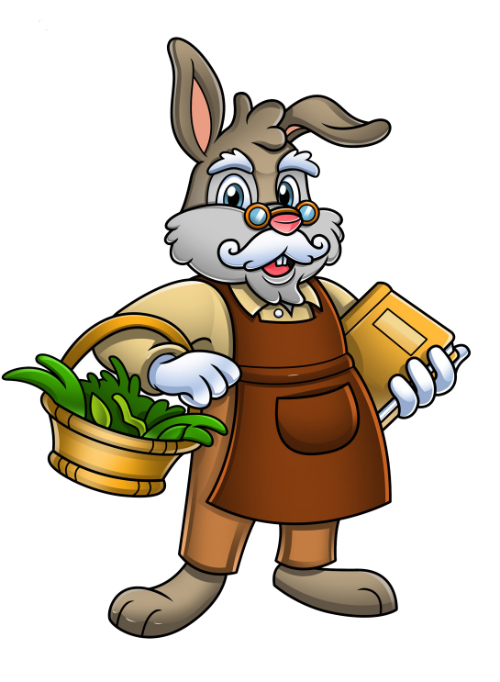 Rodent Grocer | Natural Herbs for Rodents & Rabbits!
Rodent Grocer | Natural Herbs for Rodents & Rabbits!
The Rodent Grocer specializes in herbivores (plant eating) rodents. These animals benefit greatly from herbs. Rabbits, Guinea pigs, Chinchillas and Degus need herbs in their diet to stay healthy.
Where are our rodent herbs picked?
The picking location of the herbs is very important. Herbs may not be picked in a polluted place. So not next to the road, or around industrial areas. Our herbs are all picked in nature reserves.
Only the most beautiful plant is included
Only the most beautiful plant may be picked. Plants with spots, bugs or insects are not picked. A plant must be healthy and clean to be considered for the rodents.
View all herbs from the Rodent Grocer here
How are our rodent herbs harvested?
The weather conditions play a major role when picking herbs. The weather should be dry and preferably sunny and windless. These are the best conditions for picking herbs. It depends on the plant at what time of day they may be picked. Our grocer is aware of this and knows exactly which time to choose for which plant. In the summer, the plants should be picked in the morning (because of the heat), before they wither in the sun and the volatile substances evaporate. So early in the morning but after the dew has evaporated.
Picking herbs after a rainy day is also not allowed. The herbs are then very difficult to dry and can mold and rot more quickly.
In order to retain as many active ingredients as possible, it is important to keep an eye on the harvest times. Our grocer also keeps a close eye on this.
Branches : Our branches are usually cut in the winter, when there are no more leaves and the nutrients are well preserved within the branch.
Bark : Best harvested in early spring. Just before the flowering period, the sap flows abundantly through the twigs and branches.
Leaves : These are best picked after the buds appear at the beginning of the flowering period. This is the time when leaves contain a lot of juices. Picking too early makes the leaves too wet and picking too late makes them poor in active substances.
Flowers : These are best picked at the beginning of the flowering period. Just before they open, but before they fully open. The timing has to be perfect! Our roses are also harvested as buds.
Fruits : Our fruits are harvested just before ripeness. This is the perfect moment.
Harvesting in a respectful way
 We believe it is important that our herbs are harvested in a way that respects nature. This means that nature is not trampled, the animals that live within this nature are not affected and the harvest sites are not thinned out. Harvest sites must be able to rest. We also take protected plant species into account, these may not be affected.
We believe it is important that our herbs are harvested in a way that respects nature. This means that nature is not trampled, the animals that live within this nature are not affected and the harvest sites are not thinned out. Harvest sites must be able to rest. We also take protected plant species into account, these may not be affected.
We support the butterfly and bee population through the way we sow and harvest.
How are our rodent herbs dried?
A dried herb can be used all year round. Once all the moisture has evaporated, there is no chance of mold or rot. This is also the reason why we advise not to pack the herbs in plastic. In high humidity, moisture can get into the plastic and cause mold and rot. Bacteria have free rein when the environment is humid. A well-dried herb normally contains no more than 10% moisture.
Before our herbs are dried, they are cleaned. That is, freed from soil, ground, moss and excess plant parts. This happens immediately after harvesting the plant. Then the drying process can begin.
The flowers need to be dried in the dark, while roots dry better in the open air. Each part of the plant has its own preference for a drying process. We take this into account so that we can guarantee the best quality.

Storing herbs
Herbs should be stored in a dark, cool and well-ventilated place. Most medicinal plants can be stored for no longer than 2 years after harvest. Roots and bark can be stored longer than flowers and leaves.






